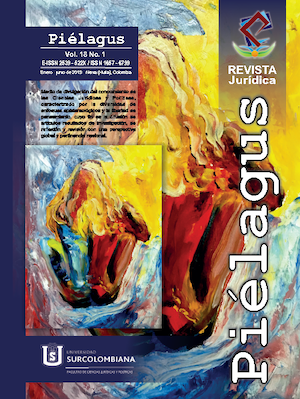The normal and the named: A theoretical approach to Public Law in Colombia
Lo normal y lo nombrado: una aproximación teórica al Derecho Público en Colombia
##plugins.themes.bootstrap3.article.main##
In this research we consider the law as a subjective experience that is, as a field in which different actors deploy strategies to intervene in its construction. The crucial question and starting point is, how to conceive the law? To answer this question, the work has been divided into three parts; first, a journey is made through different concepts of law, from the legal sciences; second, although the reconstruction of the same concept continues, its analysis is deployed from a non-legal approach, through thinkers outside the law; the third and last part sets out what is meant by public law in this research, relating the concepts studied in the first two sections, and linking them with the theoretical apparatus of Michel Foucault; In other words, adopting an analytical posture from biopolitics. Finally, we understand that public law is a space where different actors and multiple strategies intervene, facing the monopoly of naming the right to life for a population. In this scenario, sexual rights and reproductive rights are also slipping, because together with the right to health, they have a legal way of life, according to human dignity.
Downloads
##plugins.themes.bootstrap3.article.details##
REFERENCIAS BIBLIOGRÁFICAS
I. Agamben, G. (2001). Medios sin fin. Valencia, España: Pre-textos.
II. Agamben, G. (2011). ¿Qué es un dispositivo? Sociológica, 73, 249 – 264.
III. Arango, R. (2016). Realizando los derechos. Su filosofía y práctica en América Latina. Querétaro, México: Instituto de Estudios Constitucionales.
IV. Ariza, R. (2015). El pluralismo jurídico en América Latina y la nueva fase del colonialismo jurídico en los estados constitucionales. Revista insurgencia, 1, 165 – 194.
V. Benjamin, W. (1991). Para una crítica de la violencia. España: Taurus S.A.
VI. Borrero, C. (2006). Derechos humanos: ideas y dilemas para animar su comprensión. Bogotá, Colombia: CINEP, Centro de investigaciones y educación popular.
VII. Bourdieu, P. (1991). Los juristas, guardianes de la hipocresía colectiva. En F. Chazel y J. Commaile. (Eds.), Normas jurídicas y regulación social. Paris, Francia.
VIII. Bourdieu, P. (2000). Elementos para una sociología del campo jurídico. En La fuerza del derecho (153 – 220). Bogotá, Colombia: Siglo del hombre editores.
IX. Canguilhem, G. (1971). Lo normal y lo patológico. Buenos Aires, Argentina: Siglo XXI editores.
X. Constitución Política de Colombia. [C.P.]. 1991.
XI. Deleuze, G. y Guattari, F. (1985). Anti-Edipo. Capitalismo y esquizofrenia. Barcelona, España: Ediciones Paidós.
XII. Ewick, P., y Silbey, S. (2001). Conformismo, oposición y resistencia: un estudio sobre la conciencia jurídica. En M. García. (Ed.), Sociología jurídica: teoría y sociología del derecho en los Estados Unidos (pp. 267 – 289). Bogotá: Universidad Nacional.
XIII. Foucault, M. (1975). Vigilar y castigar. Buenos Aires: Siglo XXI.
XIV. Foucault, M. (1977). Historia de la sexualidad I: la voluntad de saber. México: Gallimard.
XV. Foucault, M. (1999). Estrategias de poder. Barcelona, España: Paidós.
XVI. López, D. (2011). El derecho de los jueces. Bogotá, Colombia: Legis.
XVII. López-Daza, G. (2017). Nuevos paradigmas del derecho constitucional colombiano. Medellín: Biblioteca jurídica Diké.
XVIII. Marx, C. (1974). La ideología alemana. Barcelona, España: Ediciones Grijalbo.
XIX. Preciado, B. (2002). Manifiesto contra-sexual. Madrid, España: Editorial Opera Prima.
XX. Valencia, H. (1987). Cartas de batalla. Bogotá, Colombia: Panamericana.
REFERENCIAS JURISPRUDENCIALES
XXI. CConst, T-406/1992, M.P. C. Angarita.
XXII. CConst, C-113/1993, M.P. A. Martínez.
XXIII. CConst, C-131/1993, M.P. A. Martínez.
XXIV. CConst, T-622/2016, M.P. J. Palacio















